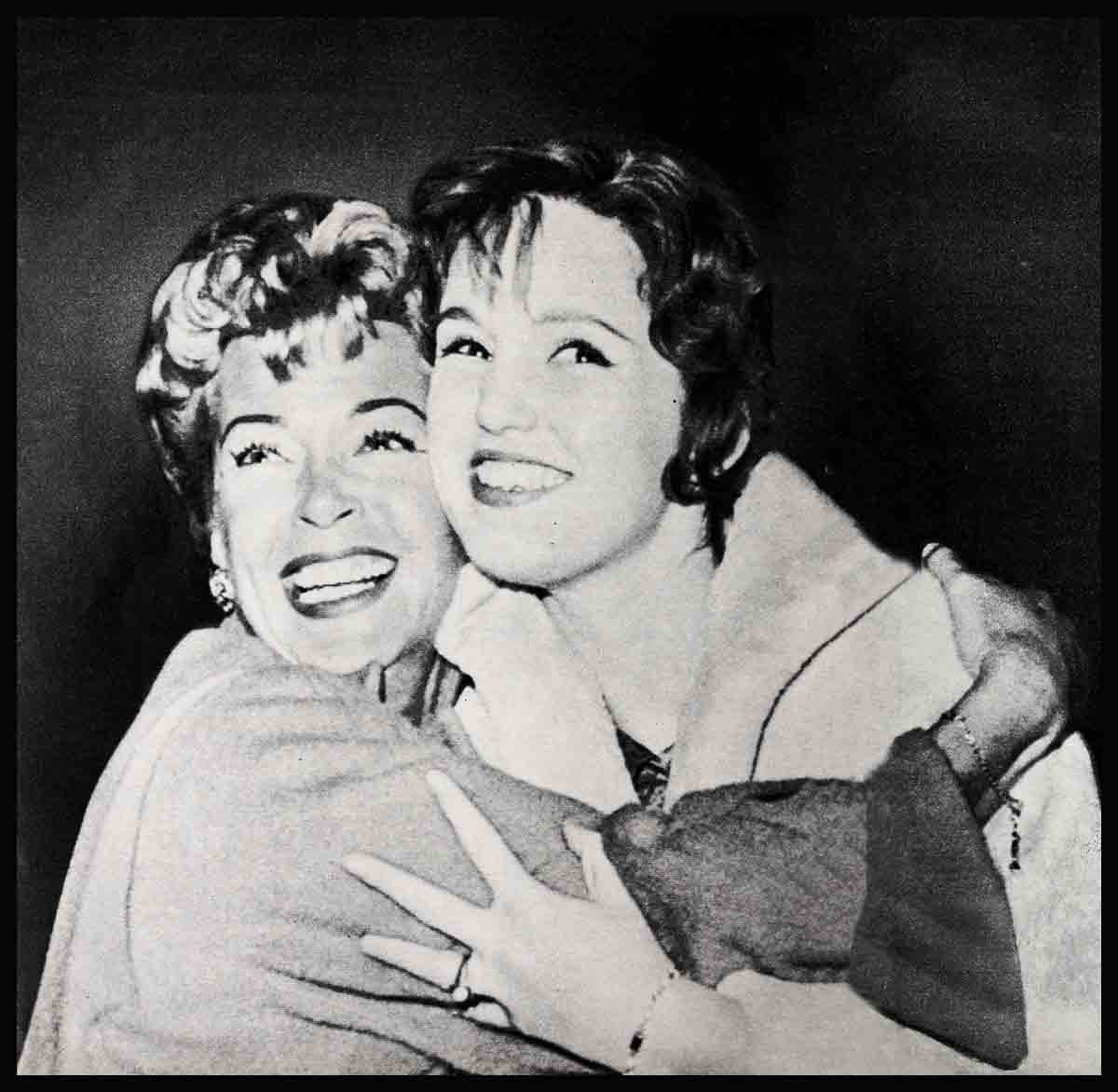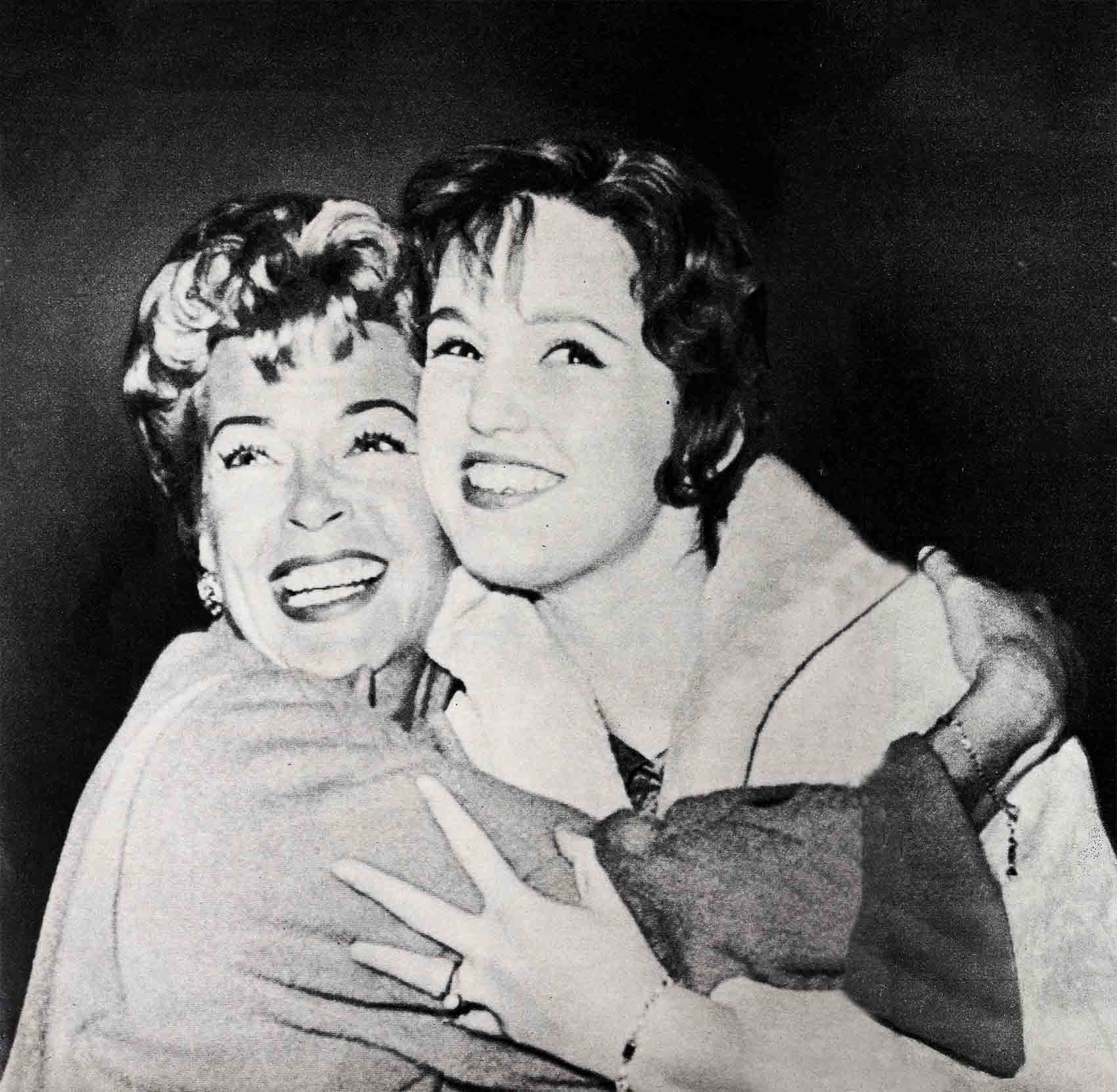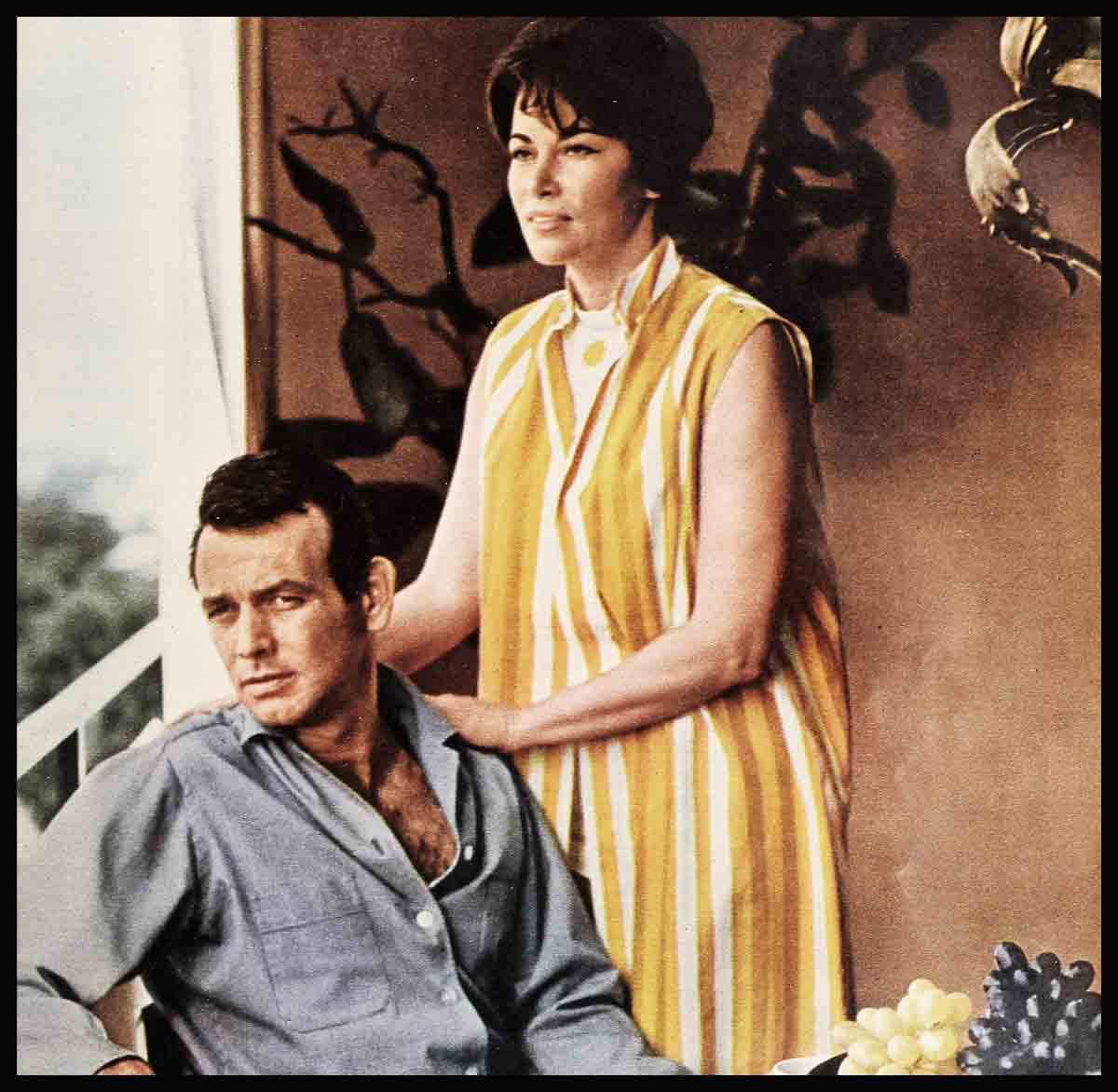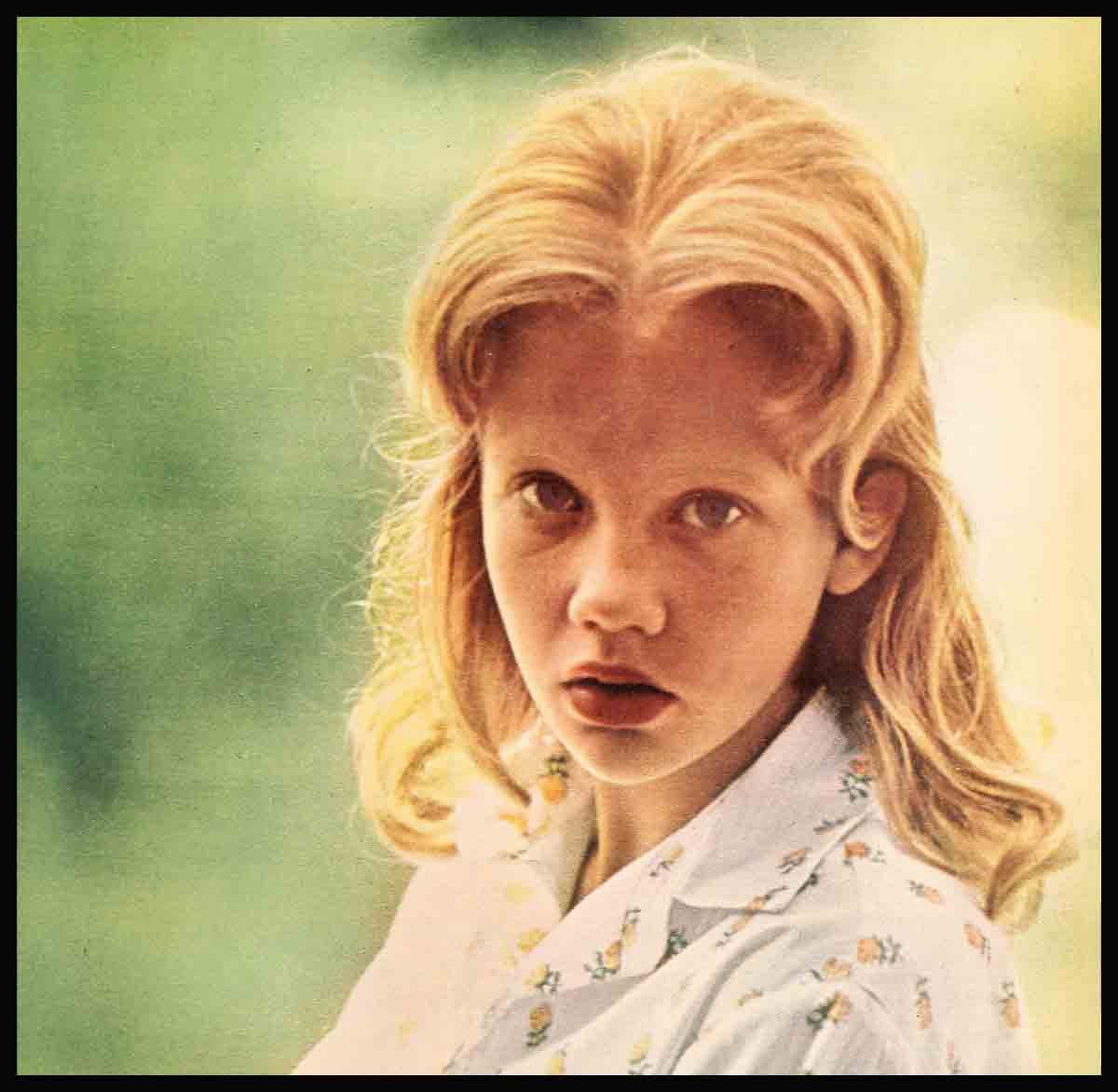
How Lana And Cheryl Find The Strength To Go On
A shiny black limousine pulled up in front of the fashionable Luau Hawaiian restaurant in Beverly Hills. Seconds later the chauffeur got out and walked around the car to the curb side to open the door.
One after another, three women stepped out. The first was a well-groomed elderly lady with greying hair, the second a slender blonde, and the third a tall, dark-haired young girl.
At the door they were met by the maitre d’hotel who, with the slightest movement of his head, beckoned the young girl aside and whispered, “It’s all ready, Cheryl—just as you planned.” Then, his voice resuming its usual deep professional tone, he said, “This way, please—” and led the three women into the dimly-lit restaurant.
They followed him closely as he wound his way in between the small round, tables until suddenly, from a dark corner, came the sound of hush-toned voices singing, “Happy birthday to you, happy birthday to you, happy birthday dear Lana, happy. . . .”
The woman fell back a step. She put a hand up to her blonde hair. “Oh, no,” she whispered, “. . . for me?” She began to laugh. Her arms went around Cheryl, standing just in front, and hugging her very tightly she said, “Oh—honey, oh . . .”
“I wanted to surprise you, Mother,” Cheryl said softly, guiding Lana towards the table. And as they peered through the dimness, they saw the laughing faces of some of Lana’s oldest friends—there was Del Armstrong, the producer; and by his side Glenn Rose, her long-time press agent; Helen Young, her hairdresser; Wilma Dunne, the well-known Beverly Hills dress designer who had created Lana’s dresses for many years; and, sitting at the back stirring a long drink vigorously with cocktail stick, was Fred May, one of Lana’s dearest friends.
“Well, darling, are you happy?” the elderly woman asked Lana as the three of them joined the group already at the table.
“Oh yes—Mother!” answered Lana, smiling. “And I’ll bet you were part of this too,” she added jokingly.
Cheryl showed her mother to the head of the table, slipped off her coat, and sat quietly and poised by Lana’s side while the other guests joked and laughed over the surprise. And as she listened she looked down at her smartly-styled dark blue silk dress, smiling as she remembered the remark she had overheard just a moment ago—“Cheryl’s so gracious . . . and she’s grown into such a beautiful young woman.” One of the guests had said it to her grandmother.
“I see you’re on time this evening Lana,” joked Del Armstrong as the waiters began serving the hors d’oeuvres of shrimp, egg roll and Balmiki, a type of marinated beef.
Thanks to Cherry—she’s the punctual one of the family,” joked back Lana, smiling proudly at her daughter.
Cherry had been particularly punctual that first day back at school . . . her first since that frightening dark April night when she stabbed Johnny Stompanato. The school was a new one for Cherry, Beverly Hill High, and was just around the corner from her grandmother’s home where she was living.
It had been a lonely walk to school. Her mother couldn’t be with her. After the trial the court had made Cheryl its ward, saying Lana could only see her once a week. Cherry sighed. Her mother and father were still fighting over her, fighting as they had been ever since she was a baby.
She turned into the huge grounds which surround the two-and-three story brick building of the school itself. She felt lost . . . and terribly alone.
Then Cheryl noticed a group of girls whispering and pointing from a corner as she walked through the main hall. Though embarrassed and feeling strange, she went up to them. “Could you tell me where I might find the principal?” She asked.
They giggled. Then one said, “You’re Cheryl Crane, aren’t you?”
“Yes, that’s right,” she answered, wide-eyed.
They laughed again. Then the tallest one said, “Go to the end of corridor and turn right.” This sent them off into peals of laughter that followed her down the hall.
When Cheryl found that the principal’s office wasn’t at the end of the hallway, she knew the reason why.
“I often used to see her wandering around all alone,” a tenth-grader said, several weeks later. “She was like a lost ghost. Sometimes I thought I’d go over and ask her if I could direct her somewhere but I kind of didn’t want to be seen talking to her. There was that sort of feeling around—you know.”
Most of the girls felt that way. Some had been warned off by their mothers. Some felt embarrassed at the idea of talking to a girl “who’d killed a guy.” And the only people who spoke to her were the teachers. She ate lunch and studied quite alone.
But now, as Cheryl looked around the happy birthday group, it all seemed so far in the past.
. . . “I can see Cherry knows what I like to eat.” Lana’s voice could be heard over the chatter of the party, as the waiters served the next course of specially prepared chicken with peas and chestnuts and pressed duck. Lana turned to Cherry. “Must have been all those Chinese meals we used to have on Sundays,” she whispered.
But those meals had been very different.
There had been the time they had gone together to one particular Chinese restaurant—the one where Cheryl had learned first about her mother’s favorite dishes.
But instead of laughter and relaxation there was tension and strained conversation.
“Are you sure you’re well?” Lana had asked for practically the hundredth time that day.

“Yes, Mother.” Cheryl looked down at her plate, breaking the awkwardness by eating almost continuously . . . first a little of the egg roll, then shrimp, then some fried rice. “How’s the movie going?” she asked at length.
“Fine, honey. And everyone’s been so kind. But I get so tired, although I wouldn’t want to be without the working. I don’t do much else these days, Cherry, except think and worry about you. . . .”
Cheryl dug her fork deep into the rest of the egg roll. What could she say? Could she tell her mother that she loved and worried about her too? And could she tell her about school and the loneliness . . . ?
“How is school?”
“A little better, Mother . . . really.”
But school wasn’t fun like it was for the other kids. Cheryl always sensed them staring at her, and pretty often, she was right. They were also talking about her.
One day a group of girls paused in front of the mirrors in the girls’ locker room to talk. One of them told the latest joke about Cheryl.
Even before they laughed, they heard the gasp behind them. Cheryl, early for gym class, had been standing not ten feet away. At the sight of her face, the laughter disappeared.
“I never felt so low in my life,” one girl said later. “Until I saw how she looked, I’d sort of figured—well, that she didn’t care. Like she didn’t have any feelings. You know, after all that happened to her, here she was going to school every day—you get the feeling nothing bothered her. But when she turned around and ran out of that room, well, I just wanted to go down on my knees and say, ‘Gee, I’m sorry. I was wrong.’ After that—well, the bunch of us had to make it up to her somehow. And we figured the nicest thing we could do was just kind of make her feel at home.”
It began like that. A couple of girls catching up to Cheryl as she ran down the lawn away from the gym, not apologizing, not knowing what to say—but suddenly there, beside her, handing her a notebook she had dropped, starting to talk, a little breathlessly, about nothing at all.
And Cheryl, staring at them with hurt, frightened eyes—and then, slowly, beginning at last to understand.
When they left her, they had promised to save her a seat at lunch. For the first time that day, she ate her sandwich and drank her glass of milk as part of a crowd. And the curious eyes that focused on her were met, for once, not by her own shy ones, but by those of the girls around her—defiant and unafraid.
All it took was that. Within a month she knew half the girls in school. They walked her home, they traded notes with her, borrowed her clothes, and found to their surprise that they didn’t have to think of Cheryl as a charity case—she had a lot to offer in friendship, a good sense of humor, a tremendous amount of generosity, a sympathetic ear. It got to the point where one teenage boy complained to a reporter, “Cheryl? Why, she’s the most popular girl in school. If you say anything bad about Cheryl, you can’t get a date with any girl in the place.”
And as facts began to replace fiction, the stories, the jokes died down. What was there to say about Cherry really? That she was a quiet girl who usually sat in the last row of class. That she was, despite her new friends, still shy, still with-drawn. That, as the boy said, once the girls took her in charge, they looked out for her just fine.
Cherry had never had friends of this sort before. These were not the girls who had gone to private school with her, girls a little too rich, a little too spoiled, a little too homesick for real friendship. These were not the girls she had met in the few weeks of school she had gotten in the dozens of cities, the foreign countries she had visited with her mother—girls who knew that Lana Turner’s daughter was staying for just a few weeks, who regarded her as an object of curiosity to be pumped for information about Gregory Peck and then dropped for more permanent pleasures. These were girls who were used to living in one place, to going home at night to their parents and families, who were not overly impressed with movie stars because the town was full of them even if their kids seldom went to the same schools. These were normal, average girls, interested in normal average things. Slowly, Cherry began to imitate them, to dress like them, laugh like them. Her tongue became accustomed to the give and take of their chatter. She stopped stooping to hide her height. Her gestures became less awkward because she no longer felt stared at whenever she moved.
And the bad dreams began to disappear.
Lana, seeing it happen, told her mother that the weight was beginning to lift from her heart. She almost burst with happiness the day Cheryl told her she had been invited on a picnic one Sunday. “But of course I turned it down. I told them, ‘That’s my day with my mother.’ ”
Steve Crane, watching this closeness grow, called off his suit for Cherry’s custody. “She seems to be doing so well,” he told friends. “As long as she’s happy, it’s all right with me.” And Cheryl no longer felt that her parents were tearing her to pieces in their battle for her custody; she no longer had to feel disloyal to each by loving the other.
She even began to date. She had been a little too tall, a little gawky at the time of the tragedy. Now, with her sleep less troubled, she was beginning to fill out in all the right places, to grow up, to know how to wear clothes. Some of her dates were arranged by her girlfriends in school, but more and more boys were becoming—automatically attracted to Cherry, to her dark good-looks, her graceful walk.
In December she went to New York with her father to meet his new fiancee, Helen DeMaree. Lana, who, a few months before, had viewed Steve’s announcement that he was going to marry again with real fear—afraid it might be part of a plan to convince the court he could provide a real home for Cherry—no longer protested against her going. She helped her choose new clothes. She even met Helen when she brought Cherry home, and thanked her for “being so good to my little girl.”
Then, after they drove to Cherry’s grandmother’s house Lana took time to admire the scrapbook of clippings Cherry had made from the trip; the photographs and menus. And they laughed together over the gossip column items that hinted Steve Crane was so attentive to his daughter that his fiancee was probably jealous. For the first time in nearly a year, she and Cherry were able to be together without strain, without guilt, with a return of the wonderful closeness they used to share. For Lana, work and quiet and old friends had healed her own heart—but seeing that her daughter was happy, too, was beginning to bring back real joy to her life.
Then, that day, when Cherry called Lana to suggest that she go to dinner with Grandmother and herself at the Luau, Lana didn’t even hesitate. The Luau belonged to Steve Crane—a few months ago she would have starved to death before eating in there. There were usually reporters around on the lookout for celebrities—a few months ago she would have avoided being seen by them, would have protested violently against publicity for Cheryl. But now—“Sure,” she told her daughter cheerfully. “You want to pick me up or shall I come by for you. . . ?”
But Lana had expected a quiet dinner for three—not this wonderful surprise.
The waiters handed round rum drinks, served in hollowed out pineapples, and brought a glass of milk for Cheryl. And as they were being served one waiter slipped a large box, wrapped in colorful palm-tree patterned paper, under Cheryl’s chair. Then, just as Fred May was about to stand and make a toast, Cheryl whipped the box from under the chair and placed it in front of her mother. Lana gasped.
“It’s for you—Mother. Open it.”
“Quiet, everyone,” called Fred.
And they all watched Lana unwrap the paper, unclasp the box and draw out an Hawaiian hat, gaily decorated with brilliant tropical flowers. “Oh . . . Cherry . . . honey . . . !” she cried.
“There’s a note too, Mother,” said Cheryl, peering into the box. Lana found it tucked in a corner of the hat, and after she had slipped the small card out of the surprise gift, her eyes filled with tears as she read: “To my mother . . . Thank you for everything—Cheryl.”
Fred lifted his drink. “To Lana,” he said, holding it high. “And our charming hostess,” he added, turning to Cheryl.
“To Lana and Cherry,” chanted the others. And they drank.
The dishes were taken away, the desserts arrived, and the coffee. And then Lana noticed her daughter looking at her watch and heard someone remark, “Curfew time, huh, Cherry?”
And she saw her daughter nod. “I have school tomorrow, you know,” Cheryl said. This time there was pride in her voice as she said it. The pride of a girl who had found the place where she belongs at last.
Down the table, Lana’s eyes met Cherry’s, and the look they exchanged was one of love and understanding.
THE END
—BY CHARLOTTE DINTER
LOOK FOR LANA IN U-I’S “IMITATION OF LIFE.”
It is a quote. PHOTOPLAY MAGAZINE MAY 1959





zoritoler imol
24 Nisan 2023I am perpetually thought about this, regards for putting up.